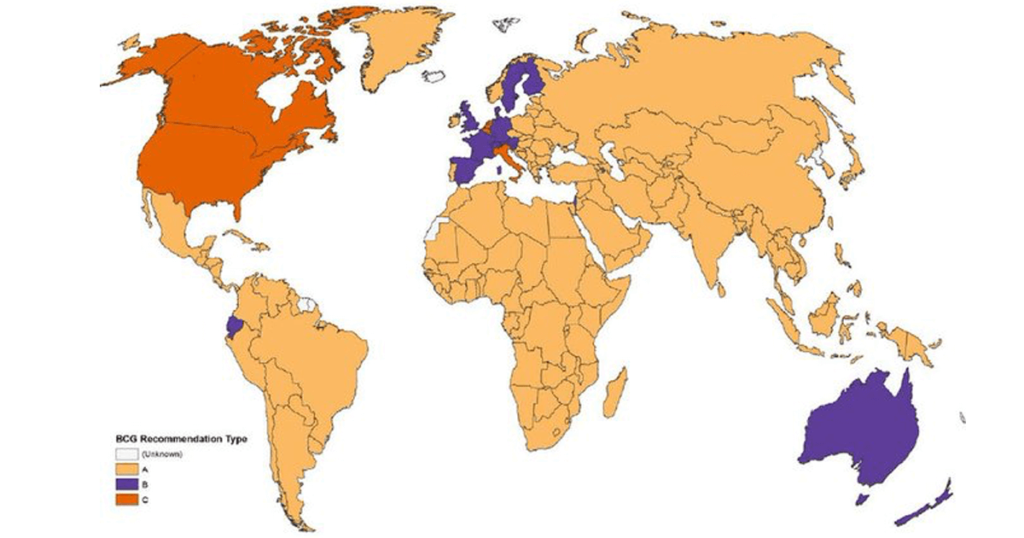A Century-Old Immune-System Booster?
One widely used TB vaccine might be offering some protection

On the morning of March 30 at my home in Kamakura, Japan, I stared slack-jawed at a map of the world I had found on a reputable website, and asked my wife, Yoshie, “Say, did you ever get a vaccine called ‘BCG?’”
Her reply: “Yes, of course. Everyone in Japan gets that.”
Therein lies a possible answer—and let me reiterate, using capital letters for emphasis, a POSSIBLE answer—to a question that has confounded me and countless others as the coronavirus has ravaged country after country in recent weeks:
How come Japan has gone relatively unscathed so far, despite low levels of testing and no major lockdown measures? Why, when millions in the United States and Europe are cowering at home amid horrific images of trucks carting off the dead from nearby hospitals, are Japanese leading relatively carefree lives, forgoing large gatherings and observing some precautions but behaving, with the endorsement of the nation’s public health establishment, as if the risks of interaction are low?
As readers of The American Scholar may recall, I wrote about this issue last week on this site, dismissing facile explanations based on the fastidious hygiene, obsessive mask-wearing, and other customs of Japanese people as well as conspiracy theories that the government is suppressing evidence of widespread infection. With the caveat that I’m no expert (I’m a journalist and author specializing in economics, not science), I hazarded a guess, based on work done by a well-regarded epidemiologist, that Japan’s early closure of schools could have been a critical factor.
But in the past several days, a tantalizing new theory has emerged that BCG—a 100-year-old vaccine for tuberculosis, usually administered to newborns—may account for much of the difference between countries, including the surprisingly small number of deaths in Japan. And as you’ll see from links to articles posted below, some experts believe BCG could help in the fight against the pandemic.
Before arousing unwarranted excitement, let me convey a hot news flash from Japan that runs counter to the preceding paragraph: Ken Shimura, a popular comedian, died of COVID-19 on Monday at age 70—Japan’s first celebrity fatality from the pandemic. Now, Shimura had reportedly been a heavy smoker, which might have rendered him particularly vulnerable. Still, the obvious point is that BCG affords no miraculous protection. In fact, it isn’t even designed to combat viruses; TB is a bacterial disease.
But according to a number of people far more knowledgeable than I (again, see the links to the articles), BCG apparently boosts the immune system in various ways that help reduce certain viral infections. Studies are just getting underway, in Australia and elsewhere, to determine BCG’s efficacy in preventing coronavirus in medical professionals working on the pandemic’s front lines.
If you study the map I was looking at, you can see why such studies are well worth trying. The countries in yellow are ones where BCG vaccines have been mandatory for many decades; the ones in orange are where vaccination has been much less prevalent (or even nonexistent) for various reasons; the purple ones are in between, with vaccinations widely given for some periods but not for nearly as long as the countries in yellow.
See Italy? It’s orange. See the color difference between Germany and the Netherlands, two fairly similar countries experiencing very different death rates from COVID-19? Ditto for Mexico and the United States, Spain and Portugal—see the color difference?
Yes, Iran is yellow—and it’s been hit very hard by the pandemic—but if you read one of the articles below, you’ll see that BCG vaccinations started there in 1984, which wouldn’t be in time to protect the elderly Iranians that have succumbed to the disease. There are interesting possible explanations for China as well. (The Cultural Revolution may well have disrupted vaccine regimens; same for the chaos and civil war of the 1940s.)
All this, I hope, explains why I was slack-jawed. Now, the slackness of my jaw may have been entirely unjustified; the evidence about BCG is still preliminary, scanty, untested, etc. Correlation does not equal causation, and these country comparisons may all be one huge coincidence. As I wrote in my previous contribution to the Scholar, Japan may turn out to be a fool’s paradise, on the verge of following Italy into COVID-19 hell. Or the most persuasive explanation for Japan’s good outcome may turn out to be sheer dumb luck.
Links:
- Science Mag: Can a century-old TB vaccine steel the immune system against the new coronavirus?
- Foreign Policy: This Vaccine Could Save Health Care Workers’ Lives Now
- medRxiv: Correlation between universal BCG vaccination policy and reduced morbidity and mortality for COVID-19: an epidemiological study
- The Age: Tuberculosis vaccine could help protect health workers from COVID-19
- Agora: BCG Map
- Bloomberg: Century-Old Vaccine Investigated as a Weapon Against Coronavirus

